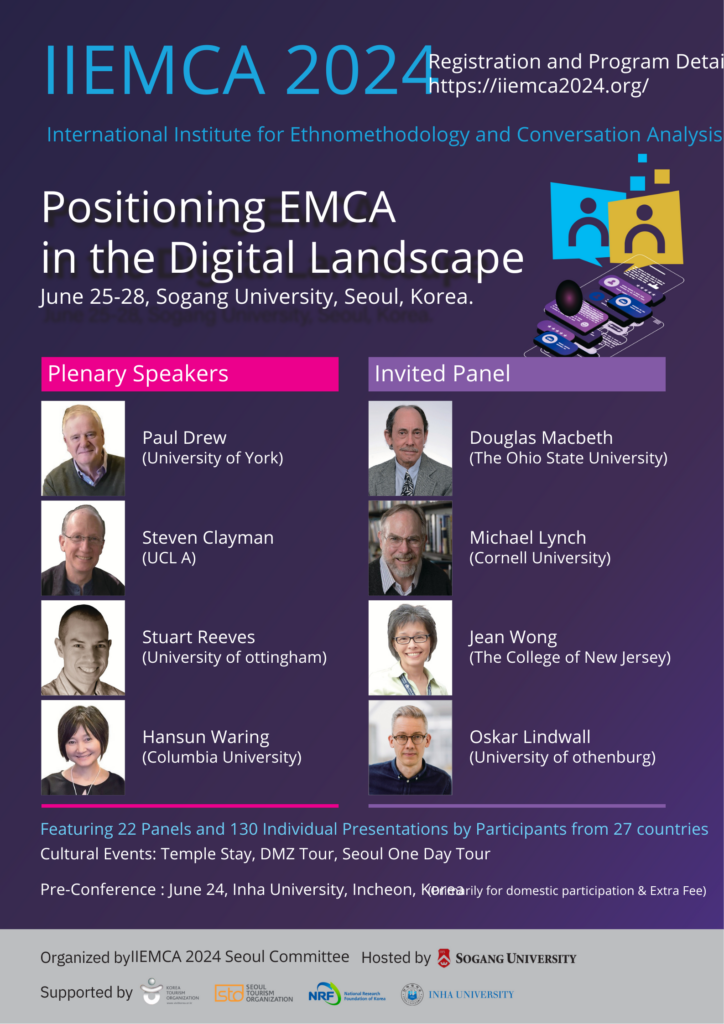Conferences > IIEMCA 2024
Positioning EMCA in the Digital Landscape
Keynote speakers
PAUL DREW
Reflections on analysing action in inter-action
In Levinson’s aphorism, language delivers action, not meaning. So it is that a distinctive feature of conversation analytic research is that we do not ask what a speaker means, but rather what is a speaker doing in a turn or turns at talk. We have understood ‘action’ in many ways, one of which is to focus on discernible actions (speech acts) such as requests, offers, complaints, and invitations. We have made considerable progress in understanding how such actions are constructed and recognised (action attribution); how actions are managed and organised sequentially; and how recipients respond appropriately to actions (e.g. preference organisation). Research into these and other aspects of (social) action has made real and substantial advances. However, in work with Kobin Kendrick on the multimodal analysis of conflictual interactions, we have encountered difficulties in applying an approach that I’ve generally favoured – attributing named actions (e.g. accusation, warning, rejection) to turns or stretches of talk. This has resulted in our adopting a quite different analytic stance to ‘action’, which I’ll outline in reflecting on some of the strengths, and shortcomings, of my usual approach to social action.
About Paul Drew Paul Drew (PhD 1977) is a professor in the Department of Language & Linguistic Science, University of York, UK, where he has taught for almost 50 years. His research and many publications in conversation analysis have focused on some of the basic communicative practices underlying talk-in-interaction, including those associated with correcting our own talk and the talk of others, social action (e.g. complaining, requesting, and recruiting assistance), and the organisation of topics in conversation. He has applied conversation analysis in pioneering research into institutional interactions (Talk at Work, 1992, w/John Heritage), notably in criminal court trials, in social welfare agencies and in medical settings – most recently in neurology (diagnosis of epilepsy, dementia), in neonatal critical case (conversations between doctors and parents) and telephone psychology therapy. He has lectured widely and led workshops in Conversation Analysis internationally. He has held visiting positions in China, Denmark, Finland, Sweden, and the US. He is an honorary member of the China Pragmatics Association and was awarded an honorary doctorate by the University of Helsinki.
Paul Drew (PhD 1977) is a professor in the Department of Language & Linguistic Science, University of York, UK, where he has taught for almost 50 years. His research and many publications in conversation analysis have focused on some of the basic communicative practices underlying talk-in-interaction, including those associated with correcting our own talk and the talk of others, social action (e.g. complaining, requesting, and recruiting assistance), and the organisation of topics in conversation. He has applied conversation analysis in pioneering research into institutional interactions (Talk at Work, 1992, w/John Heritage), notably in criminal court trials, in social welfare agencies and in medical settings – most recently in neurology (diagnosis of epilepsy, dementia), in neonatal critical case (conversations between doctors and parents) and telephone psychology therapy. He has lectured widely and led workshops in Conversation Analysis internationally. He has held visiting positions in China, Denmark, Finland, Sweden, and the US. He is an honorary member of the China Pragmatics Association and was awarded an honorary doctorate by the University of Helsinki.
STEVEN CLAYMAN
Arrangement-Making: An Activity Context for the Enactment of Benefactive Identities and Reciprocity
In planning some future joint activity, interactants work out when, where, and how it will take place. This talk addresses two sets of issues regarding the making of arrangements. The first is the basic organization of arrangement-making as a “big package” of talk (Jefferson 1988) or “sequence of sequences” (Schegloff 2007) with a segmented structure in which details of time, place, and manner are addressed through a succession of remote proposal sequences that are variable in their ordering. Also considered is the launching of the arrangement activity, and the varying ways it can emerge out of some proximate or distal base sequence or activity. The second main issue is how the identities of benefactor and beneficiary become contingently relevant during arrangement-making and are treated as accountable to norms surrounding reciprocity. In this way, the relational context of arrangement making infuses the manner in which component proposals get designed and implemented. Arrangement-making is thus a strategic site for investigating the enactment of benefactive relations and reciprocity.
About Steven Clayman Steven Clayman has been a Professor of Sociology at UCLA since 1989. He is a leading scholar in CA, producing numerous journal articles and co-authoring two influential books with John Heritage.
Steven Clayman has been a Professor of Sociology at UCLA since 1989. He is a leading scholar in CA, producing numerous journal articles and co-authoring two influential books with John Heritage.
He has served as an editorial member for Research on Language and Social Interaction and other journals. His research addresses human interaction as a topic in its own right, and as a window into social institutions ranging from media and politics to (more recently) law and policing. His extensive work on questioning and answering practices in news conferences and broadcast interviews has provided insight into journalistic norms, press-state relations, and sociopolitical culture in the U.S.
STUART REEVES
Making sense of autonomous and artificially intelligent technologies in members’ work
Ethnomethodology and conversation analysis have had a long and complex relationship with the design and study of computational technologies in use, most notably perhaps via fields like human-computer interaction (HCI) and computer-supported cooperative/collaborative work (CSCW). Successive waves of development, deployment and adoption of these technologies present seemingly evergreen opportunities for EM and CA research to investigate the social organisation of action ‘with’ and around digital systems and their infrastructures. The sheer saturation of diverse kinds of computational technologies in everyday life, coupled with the pressures of institutional and funding environments, is leading to some EMCA researchers to towards studies of such systems in action.
The latest wave of computational technology facing us is often glossed as the dispersion of ‘autonomous systems’ and ‘artificial intelligence’. These systems, devices and infrastructures are – hype aside – spreading into many mundane circumstances. Such computational technologies are largely underpinned by varied machinic methods of recognition and response to people and the world around them – e.g., in terms of hardware that captures sensor data, computational models which produce classifications, and actuations which enable ‘next actions’. The promise is that this round of innovation is generating ‘smarter’ and more ‘capable’ technologies that have greater agency and capability than before.
In this talk I’ll describe how it is members’ work – regularly overlooked – that ultimately fills the gaps of computation so that it may be made to fit into social circumstances. This is crucial for the apparent success of such AI and autonomous technologies, whether it is voice recognition like speech-based agents, computer vision based apps that enable visually impaired people to ‘see’, or sensor arrays built into robots that detect and operate alongside people in public.
I will also discuss some of my persistent conundrums in examining technology and social organisation. While EMCA research has the opportunity to deeply respecify what such technologies are as resolutely and unavoidably grounded within courses of concerted practical action by members of everyday circumstances, to what end do we do this work? Do our studies illuminate the core concerns of EM and / or CA research? Is it and how might (or should?) such EMCA studies accomplish something for others, such as technologists?
About Stuart Reeves Stuart Reeves is an Associate Professor in the School of Computer Science at the University of Nottingham, UK. He has a degree in Computer Science and PhD in Human-Computer Interaction (HCI) from Nottingham. Before assuming his present role at the University of Nottingham, Stuart held postdoc positions at the University of Glasgow and the Horizon Digital Economy Research Institute. Stuart takes a hybrid approach that blends HCl research with video-based studies grounded in ethnomethodology and conversation analysis.
Stuart Reeves is an Associate Professor in the School of Computer Science at the University of Nottingham, UK. He has a degree in Computer Science and PhD in Human-Computer Interaction (HCI) from Nottingham. Before assuming his present role at the University of Nottingham, Stuart held postdoc positions at the University of Glasgow and the Horizon Digital Economy Research Institute. Stuart takes a hybrid approach that blends HCl research with video-based studies grounded in ethnomethodology and conversation analysis.
Recent work in this vein includes studies of face recognition systems (Greiffenhagen et al. 2023), of mobile robotic telepresence (Boudouraki et al. 2022), of visual impairment and assistive technologies (Reyes-Cruz et al. 2020, 2022), of video calling between families (Gan et al. 2020), of human-robot interaction (HRI) research methods (Porcheron et al. 2020), of voice assistant use in domestic settings (Porcheron et al. 2018), of mobile device use in the outdoors (Smith et al. 2020), and of design practitioners evaluating usability of digital artefacts (Reeves 2019).
HANSUN ZHANG WARING
Invoking (Dis)likes at the Dinner Table:
Conversation Analysis and Language Socialization
In describing how a middle-aged couple’s offers of “the best herring” to their stepfather-in-law Max are repeatedly rejected, Sacks (1992) alludes to the episode as a microcosm of socialization, where “run[ning] him through enough of these sequences” would eventually produce “the ideal socialized seventy-year-old who, whatever they are offered, very nicely accepts” (p. 332). Getting the child to eat during mealtime entails just as much, if not more, interactional battling. Based on video-recordings of mealtime conversations, I show how claims of (dis)likes are differentially deployed by a 3-year-old girl and her parents in pre-taste and post-taste positions (i.e., before and after eating the food), not to ascribe or express stable psychological preferences (Edwards & Potter, 2005), but to advance the participants’ own projects in situ. As will be argued, it is via being repeatedly run through these (dis)like sequences that the child ascertains, deliberates, and revises her taste, all the while learning to use claims of (dis)likes to service her own agendas. Findings contribute to our growing understandings of subject-side assessments (Edwards & Potter, 2017), the discursive construction of eating and food (Wiggins et al, 2001), and last but not least, how conversation analysis may be usefully engaged to illuminate (language) socialization at the dinner table (Hepburn, 2020).
About Hansun Zhang Waring Hansun Zhang Waring is Professor of Applied Linguistics and TESOL at Columbia University in the USA. As founder of The Language and Social Interaction Working Group (LANSI) — a prestigious academic venue, Hansun has published several books in applied linguistics, such as Theorizing Pedagogical Interactions: Insights from Conversation Analysis and Discourse Analysis: The Questions Discourse Analysts Ask and How they Answer them. The textbook she authored with Jean Wong Conversation Analysis and Second Language Pedagogy has seen the second edition following the success of its first. With more than 70 journal articles and book chapters over the years, her research has expanded into diverse areas such as storytelling, public communication, parent-child interaction, and Al and language teaching. Her forthcoming edited volumes include (with Nadja Tadic) Critical Conversation Analysis: Inequality and Injustice in Talk-in-Interaction and (with Olcay Sert) Conversation Analysis and Language Teacher Education: Intervention Studies.
Hansun Zhang Waring is Professor of Applied Linguistics and TESOL at Columbia University in the USA. As founder of The Language and Social Interaction Working Group (LANSI) — a prestigious academic venue, Hansun has published several books in applied linguistics, such as Theorizing Pedagogical Interactions: Insights from Conversation Analysis and Discourse Analysis: The Questions Discourse Analysts Ask and How they Answer them. The textbook she authored with Jean Wong Conversation Analysis and Second Language Pedagogy has seen the second edition following the success of its first. With more than 70 journal articles and book chapters over the years, her research has expanded into diverse areas such as storytelling, public communication, parent-child interaction, and Al and language teaching. Her forthcoming edited volumes include (with Nadja Tadic) Critical Conversation Analysis: Inequality and Injustice in Talk-in-Interaction and (with Olcay Sert) Conversation Analysis and Language Teacher Education: Intervention Studies.
